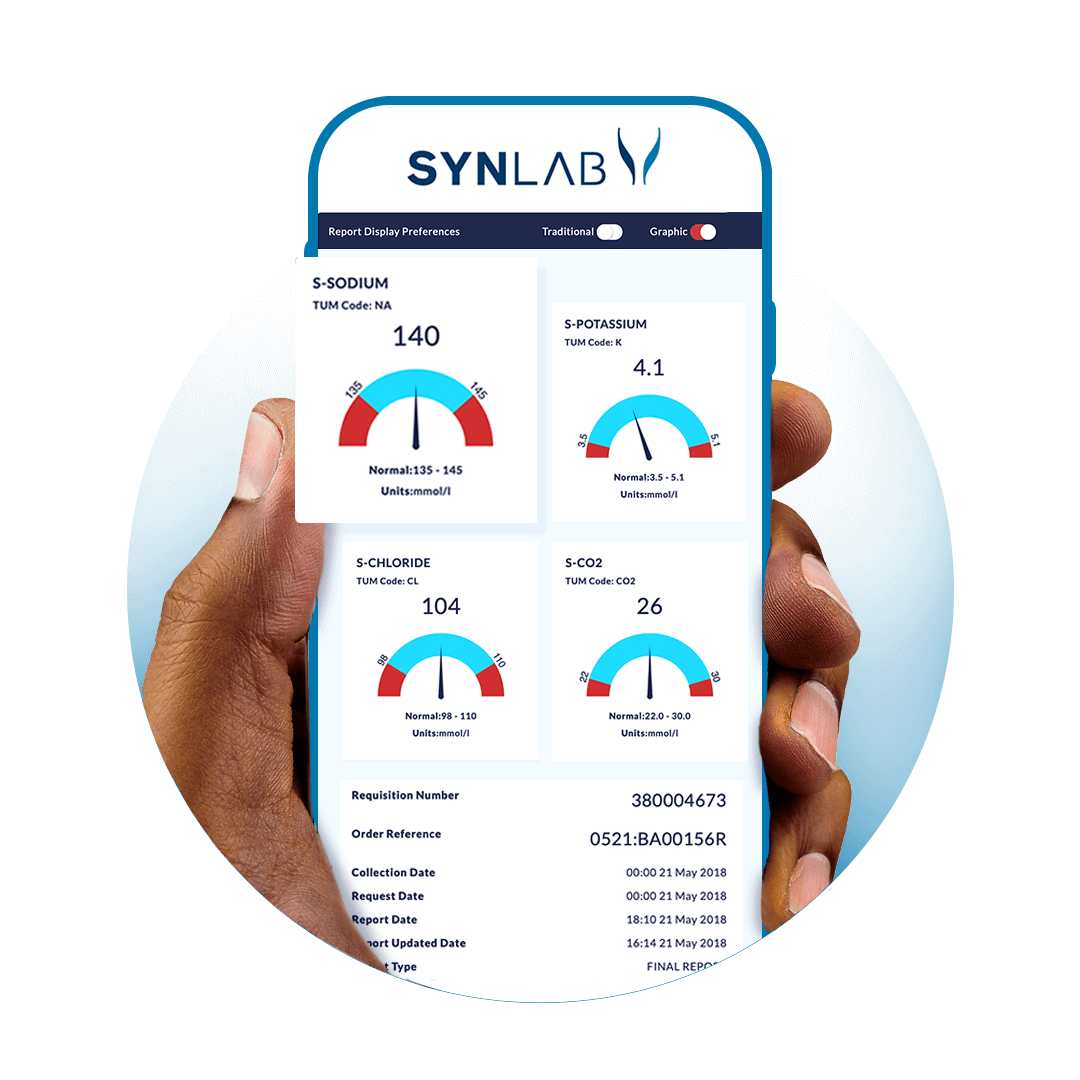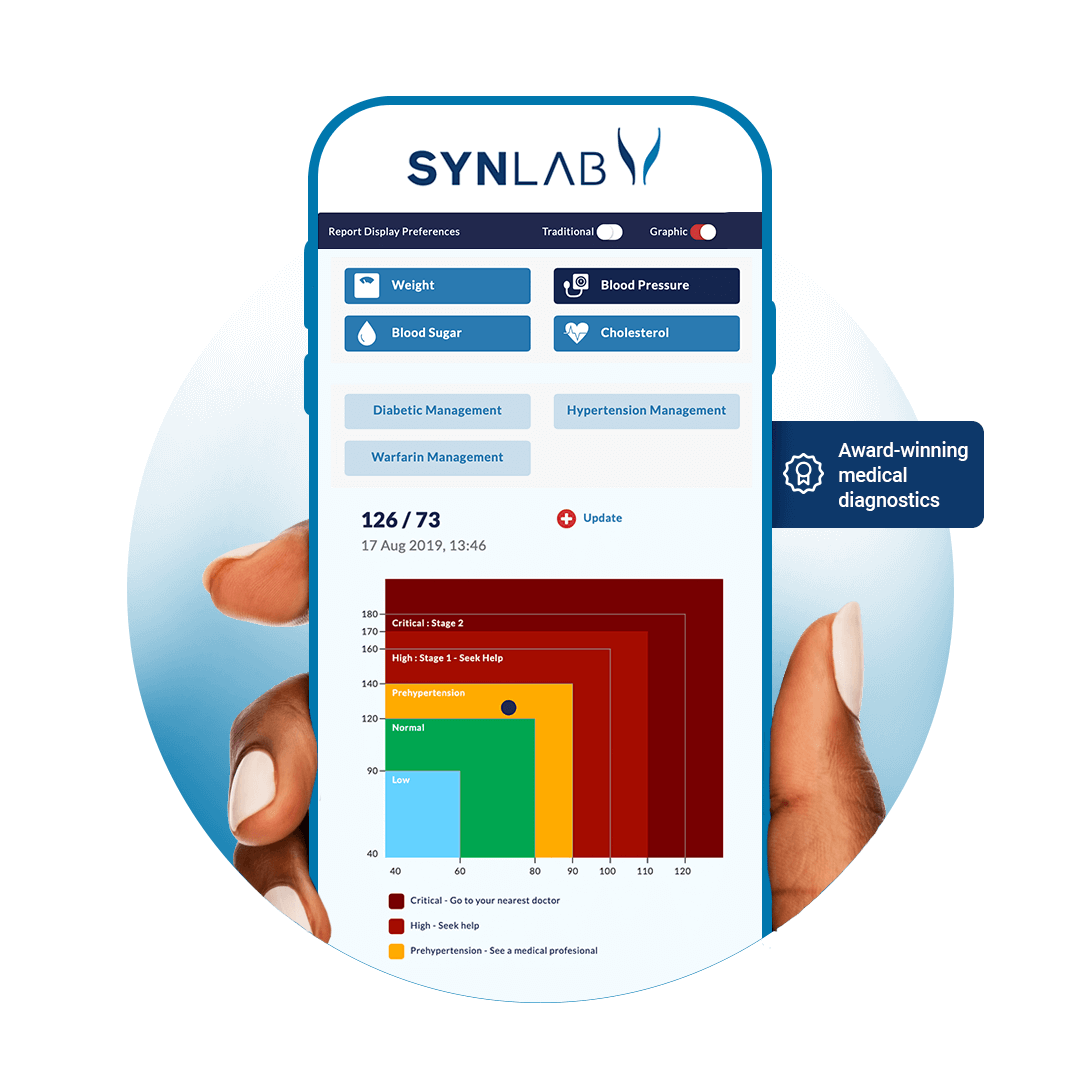Lipids
Lipids are essential for your health, but abnormal amounts of them can increase your risk of heart disease. Don’t leave your health to chance. Get tested. Take control of your health.
Confidential
Quick turnaround
Reliable accuracy
A comprehensive blood test that measures the number of fat molecules called lipids in your blood and gives insight into your risk of developing heart and blood vessel disease.
How it works

Order online
Order your test online, select, and pay for your preferred panel.

Collect your sample
Choose to have our medical team come in for home sample collection or visit a Synlab centre near you for your sample collection.

Review accurate results
Accurate and confidential results are available on your secure online Pathprovider account. You will get notified as soon as your results are available.

Get medical support
If you have any queries, please contact our 24-hour customer support centre at +234 700 7284 2273.
STATISTICS
1 in 3
Related to noncommunicable diseases in Nigeria are a direct result of cardiovascular disease.
6M
People are living with diabetes.
#1
Diabetes kills more people in Nigeria than COVID-19, TB, HIV/AIDS, and cancer combined.
Lipids are molecules that contain hydrocarbons and make up the building blocks of the structure and function of living cells. Examples of lipids include butter, vegetable oil, cheese, cholesterol and other steroids, waxes, and fat-soluble vitamins.
Lipids perform three primary biological functions within the body: they serve as structural components of cell membranes, store energy, and function as important signalling molecules. The three main types of lipids are triglycerides, phospholipids, and sterols.
Having too many lipids in your blood can lead to buildup in your blood vessels and arteries, which can cause damage and increase your risk of cardiovascular problems.
Illnesses related to lipid disorder are often asymptomatic until a person experiences a serious health problem such as a heart attack or stroke.
However, in rare cases, the following symptoms occur:
- Yellowish, fatty bumps or yellow creases on the skin are formed by an accumulation of fatty deposits around tendons and joints.
- White arcs around the eye’s cornea, which sometimes occur in younger people with high cholesterol.
- raised, yellow lumps at the inner corners of the eyes.
Causes of lipid disorder
A range of factors can cause lipid disorders, including genetics, foods high in certain types of fats, lifestyle, certain medical conditions, and other factors that can cause lipid disorders.A range of factors can cause lipid disorders, including genetics, foods high in certain types of fats, lifestyle, certain medical conditions, and other factors that can cause lipid disorders.
Cholesterol is one of the main lipids in the body. There are different types of cholesterol in the body, such as
High-Density Lipoprotein Cholesterol
High-density lipoprotein cholesterol, or HDL-c or the “good” cholesterol. It removes excess cholesterol from the body and carries it back to the liver. The liver is able to flush it from the body. High levels of HDL cholesterol can lower your risk for heart disease.
Low-Density Lipoprotein Cholesterol
Low-density lipoprotein cholesterol, known as LDL-c, or “bad” cholesterol, normally functions in the body to transport cholesterol from the liver to the body’s tissues where it is used to make other important substances like hormones for the body. When in excess, the cholesterol can accumulate and form plaques, leading to blockages that may cause a heart attack.
Triglycerides
Triglycerides are fats that come from foods you’ve eaten and are present in your body’s cells. When you eat, your body converts any calories it doesn’t need to use right away into triglycerides. They are then stored in your fat cells.
Saturated fats
Two types of fat are known to increase cholesterol levels, saturated and trans fats.
Saturated fats can increase your LDL levels.
Saturated fat is mostly found in foods such as:
Milk
Cheese
Steak
Butter
Trans fats
• Diabetes
• Hypothyroidism
• Metabolic syndrome
• Cushing’s syndrome
• Polycystic ovary syndrome (PCOS)
• Kidney disease
Frequently Asked Questions
If you are still unsure about this test, here are some questions that we usually get asked.
Still need answers?
What do lipids do?
The main biological functions of lipids include storing energy, as lipids may be broken down to create large amounts of energy.
Why do we need lipids?
Lipids are an important part of a healthy diet. The body uses lipids to store energy, insulation and to make cell membranes.
What happens if my lipids are too high?
An excess amount of blood lipids can cause fat deposits in your artery walls, increasing your risk for heart disease.
Benefits
When you get your test done with SYNLAB, you have access to our benefits.
Customer-centric reporting
PathProvider gives you direct access to all of your test results and reports across all your devices without having to leave your home.
Benefits of being a PathProvider registered user
- Your profile is a secure personal space
- Access your results any time, any day, all year round
- Results can be checked on any smartphone, computer, or tablet
- All your previous results are archived on your profile
- Set your notification preferences when results are ready. Choose email or SMS.
- Not a doctor? Switch to the popular ‘graphic view’ and get to understand your results.
- You can share or print your results directly from your profile.


Choose home collection.
Get complete convenience
Get your results as they become available online.
You can choose to get your entire family tested in the comfort of your own home. Choose a day and a time that is convenient for you, and we’ll send one of our trained professionals to your door.
No more sitting in traffic. Now you can manage your health in the comfort of your own home.
Total confidence.
Award-winning medical diagnostics
Accuracy of results, reliability, trust, and quick turnaround time.
We are audited by an external body which ensures that we implement the highest ethical standards and international best practices.
SYNLAB was awarded the 'Private Laboratory Service Provider of the Year' in Nigeria award by the Nigeria Health Excellence Awards (NHEA).

Select the test that’s right for you
Our most advanced wellness panel. It gives a detailed assessment of liver function and structure, kidney structure and function, diabetes mellitus, thyroid function, bone health, blood disease, risk of heart and blood vessel disease, Immunity, urinary tract health, and illnesses associated with chronic inflammation.
It also checks for cervical and colon cancer.
Our most advanced wellness panel. It gives a detailed assessment of liver function and structure, kidney structure and function, diabetes mellitus, thyroid function, bone health, blood disease, risk of heart and blood vessel disease, immunity, urinary tract health, and illnesses associated with chronic inflammation.
It also checks for colon cancer and the risk of prostate cancer.
A blood panel in which the tests are conducted to assess the ability of the liver to perform its normal functions.
Analysis of 90 genetic variants present in 65 genes and 17 biochemical parameters
This test uses your genetic and biochemical profile to help to identify your unique nutritional needs for optimal health and disease prevention.
